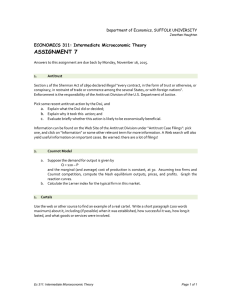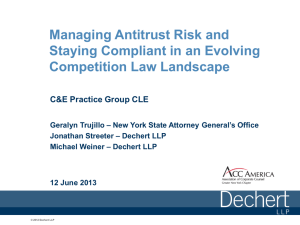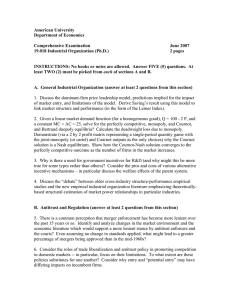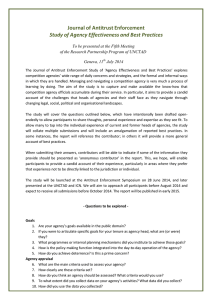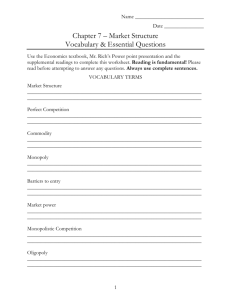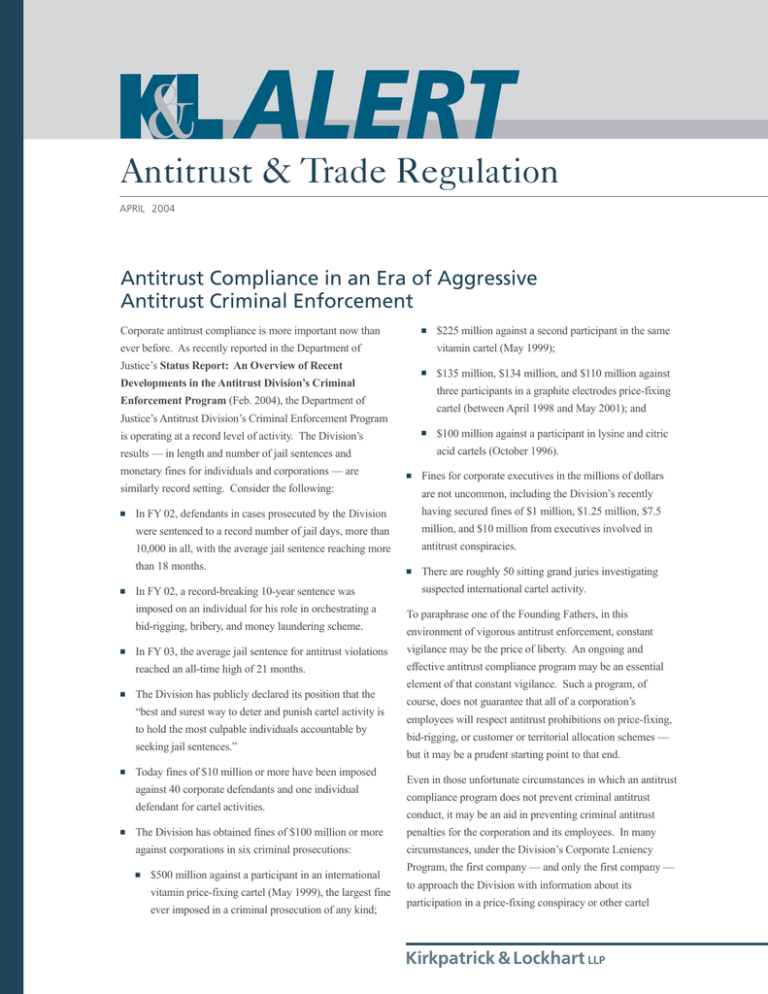
Antitrust & Trade Regulation
APRIL 2004
Antitrust Compliance in an Era of Aggressive
Antitrust Criminal Enforcement
Corporate antitrust compliance is more important now than
n
ever before. As recently reported in the Department of
vitamin cartel (May 1999);
Justice’s Status Report: An Overview of Recent
n
Developments in the Antitrust Division’s Criminal
cartel (between April 1998 and May 2001); and
Justice’s Antitrust Division’s Criminal Enforcement Program
n
is operating at a record level of activity. The Division’s
n
similarly record setting. Consider the following:
n
n
were sentenced to a record number of jail days, more than
million, and $10 million from executives involved in
10,000 in all, with the average jail sentence reaching more
antitrust conspiracies.
In FY 02, a record-breaking 10-year sentence was
n
There are roughly 50 sitting grand juries investigating
suspected international cartel activity.
imposed on an individual for his role in orchestrating a
To paraphrase one of the Founding Fathers, in this
bid-rigging, bribery, and money laundering scheme.
environment of vigorous antitrust enforcement, constant
In FY 03, the average jail sentence for antitrust violations
vigilance may be the price of liberty. An ongoing and
reached an all-time high of 21 months.
effective antitrust compliance program may be an essential
The Division has publicly declared its position that the
to hold the most culpable individuals accountable by
seeking jail sentences.”
Today fines of $10 million or more have been imposed
against 40 corporate defendants and one individual
defendant for cartel activities.
n
are not uncommon, including the Division’s recently
having secured fines of $1 million, $1.25 million, $7.5
“best and surest way to deter and punish cartel activity is
n
Fines for corporate executives in the millions of dollars
In FY 02, defendants in cases prosecuted by the Division
than 18 months.
n
$100 million against a participant in lysine and citric
acid cartels (October 1996).
results — in length and number of jail sentences and
n
$135 million, $134 million, and $110 million against
three participants in a graphite electrodes price-fixing
Enforcement Program (Feb. 2004), the Department of
monetary fines for individuals and corporations — are
$225 million against a second participant in the same
element of that constant vigilance. Such a program, of
course, does not guarantee that all of a corporation’s
employees will respect antitrust prohibitions on price-fixing,
bid-rigging, or customer or territorial allocation schemes —
but it may be a prudent starting point to that end.
Even in those unfortunate circumstances in which an antitrust
compliance program does not prevent criminal antitrust
conduct, it may be an aid in preventing criminal antitrust
The Division has obtained fines of $100 million or more
penalties for the corporation and its employees. In many
against corporations in six criminal prosecutions:
circumstances, under the Division’s Corporate Leniency
n
$500 million against a participant in an international
vitamin price-fixing cartel (May 1999), the largest fine
ever imposed in a criminal prosecution of any kind;
Program, the first company — and only the first company —
to approach the Division with information about its
participation in a price-fixing conspiracy or other cartel
Kirkpatrick & Lockhart LLP
activity (and which meets certain other qualifications) is
Each of these areas represents a potential antitrust hotspot
granted “amnesty” from criminal prosecution and fines.
that can generate criminal fines and penalties or civil
Cooperating officers, directors, and employees of the
liabilities.
company “first in the door” are also immune from jail
The Division has a vast armament of investigative weapons at
sentences and fines, if they satisfy certain conditions,
including cooperating with the government’s investigation.
The first-to-disclose feature of the Leniency Program creates
huge incentives for a co-conspirator to be the first to defect
and to disclose all that the company and its employees know
its disposal when investigating suspected antitrust violations.
The Division’s recent Status Report demonstrates its
abundant willingness to employ them, and its success in
doing so.
JAMES E SCHEUERMANN
about the illegal conspiracy. Failing to be the first in the
jscheuermann@kl.com
412-355-6215
Division’s door can be the difference between no criminal
fines for the corporation and no fines and jail sentences for its
executives, on the one hand, and substantial fines and jail
sentences, on the other hand. The facts are revealing: in the
K&L’s Antitrust & Trade Regulation Practice Group provides
first six months of FY 03, amnesty applications under the
comprehensive antitrust and trade regulation litigation and
Leniency Program averaged three per month, and the
counseling to corporations and individuals. We litigate
Division reports that it “frequently” encounters situations in
criminal and civil antitrust cases. We counsel clients on both
which a company approaches the government within days, or
domestic and international competition issues. Our White
less than one business day, after a co-conspirator has secured
Collar Criminal Practice Group attorneys routinely handle a
its position as first applicant for amnesty.
variety of high-visibility state and federal investigations, grand
Corporate counsel and executives will quickly recognize that
the first-to-disclose feature of the Leniency Program also
creates substantial incentives for companies to have in place
an antitrust compliance program that effectively enables early
detection of cartel activity. In this area of life, as in so many
others, a perfect method for creating drama, and possibly not
insubstantial harm, is to do nothing or to do something late.
jury proceedings, and criminal trials on behalf of corporations
and individuals. Our antitrust and white collar criminal
attorneys have also conducted complex internal investigations
and provided compliance advice to corporations. To provide
the most effective representation for corporations and
individuals who are being investigated in connection with
antitrust crimes or who have been charged with such crimes,
K&L combines an in-depth understanding of the nature of
As part of its implementation of an ongoing and effective
antitrust offenses and the objective economic criteria for
antitrust compliance program, a corporation may find it
identifying collusive behavior with a comprehensive
prudent to analyze the antitrust implications of its ongoing
knowledge of criminal procedure and effective litigation skills.
business conduct, including, for example:
Contact information:
n
sales and marketing activities;
n
bidding;
Thomas A. Donovan
412.355.6466 tdonovan@kl.com
contacts with competitors and would-be-competitors,
Mark A. Rush
412.355.8333 mrush@kl.com
n
James E. Scheuermann 412.355.6215 jscheuermann@kl.com
including contacts in the context of tolling or outsourcing
arrangements;
n
communications with potential merger and joint venture
partners; and
n
trade association activities.
®
Kirkpatrick & Lockhart LLP
Challenge us.®
BOSTON
n
DALLAS
n
HARRISBURG
n
LOS ANGELES
n
MIAMI
n
NEWARK
n
NEW YORK
n
PITTSBURGH
n
SAN FRANCISCO
n
WASHINGTON
.........................................................................................................................................................
This publication/newsletter is for informational purposes and does not contain or convey legal advice. The information herein
should not be used or relied upon in regard to any particular facts or circumstances without first consulting with a lawyer.
2
LLP. ALL RIGHTS RESERVED.
© 2004 KIRKPATRICK & LOCKHART
KIRKPATRICK & LOCKHART LLP ANTITRUST & TRADE REGULATION UPDATE

